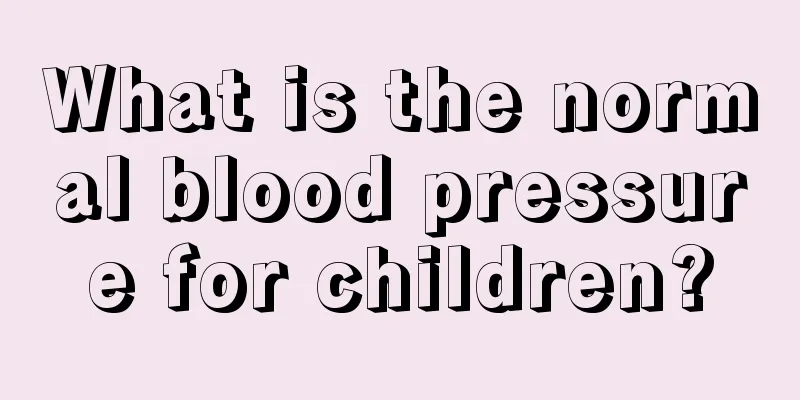What is the reason for children's sleepiness? It turns out to be these 4 points

|
Children's sleepiness has always been the biggest worry for parents, because it not only affects children's academic performance, but also indicates that there is a problem with the child's health in one way or another. So what factors in daily life can cause children to be sleepy? In fact, most of these are related to fever, hypoglycemia and other diseases. Parents must take their children to the hospital for treatment in time. There are many factors that cause sleepiness in children, the most common ones are fever, hypoglycemia, encephalitis, meningitis, drug side effects, poisoning, etc. (1) Fever. Children's reactions to fever vary from person to person. Some are more excited and have restless sleep, while others are drowsier. There are also cases where drowsiness occurs first and fever is later discovered. People with a cold generally do not experience drowsiness, but there are people who experience a cold with fever and drowsiness, but their energy returns once the fever subsides. Common serious infections, such as sepsis, especially infections of the central nervous system, should be diagnosed and treated early if they first manifest as drowsiness, then develop into coma, and then have neurological symptoms such as convulsions and hemiplegia. (2) Hypoglycemia. Early symptoms of hypoglycemia may include drowsiness. Children often have a history of not having dinner the night before and are sleepy and unable to get up in the early morning. They may have hypothermia, cold sweats, pale complexion, and may develop coma and convulsions. Newborns show symptoms such as lethargy, drowsiness, and difficulty feeding. (3) Encephalitis and meningitis. Especially in spring and autumn when viral encephalitis is prevalent or in areas where Japanese encephalitis is prevalent in summer, if children have a high fever accompanied by drowsiness and vomiting, we should be alert to such diseases and do blood and cerebrospinal fluid tests. Severe cases may start with drowsiness, gradually go into coma, and develop neurological symptoms such as convulsions and paralysis. (4) Side effects of medication. Some therapeutic medications contain sedative effects. For example, some antidiarrheal mixtures, medicines for treating colds and fevers, antitussive drugs, antiallergic drugs, and anti-vertigo drugs may cause drowsiness in children. If your doctor tells you that the side effects of the medication may cause drowsiness when prescribing the medication, then you don't have to worry, as the drowsiness symptoms will disappear after you stop taking the medication. How to deal with sleepiness (1) Observation. If a child is drowsy, check whether he or she has a fever first. If you have a fever, you should see a doctor to check the cause and receive treatment. If a child is drowsy and has no fever, you need to be alert. First, we need to review the child's eating habits and consider whether there is a possibility of hypoglycemia. At the same time, check the storage and use of medicines at home, and pay attention to whether they are taken by mistake. Observe whether other people around you are also showing signs of drowsiness to determine whether they may be poisoned by gas or pesticides. (2) Treatment. For children with fever, antipyretic drugs can be used as appropriate. For children who are drowsy but not feverish, they should see a doctor to check the cause and receive targeted treatment. (3) Prevention. If a child who usually likes to be active suddenly becomes quiet, calm and has a fever, parents should be vigilant and take the child to the hospital for diagnosis and treatment in time. If parents find that their children are showing signs of sleepiness, don’t panic! First of all, we need to analyze the child’s daily life, find out the reason for the child’s sleepiness and what factors cause it, and carefully analyze why the child is sleepy? So as to find a solution to the problem and let the children grow up healthily and happily! |
<<: Symptoms of mercury poisoning in children, mothers must know
>>: If your child's ears get inflamed, parents should remember these methods
Recommend
What should I do if my child has a fever at night?
The problem of children's fever makes parents...
What are the benefits of swimming for newborns?
Many parents like to let their newborns go swimmi...
What to do if your child has flat feet
Once a child develops flat feet, standing and wal...
Baby's buttocks red
If your baby has a red butt, it is likely that th...
Spots on children's fingernails
Children are the apple of every parent's eye,...
What are the diets for children with autumn diarrhea?
Many people who have been parents may know that d...
What to do if your two and a half year old baby has a picky eater
Children can usually be weaned when they are abou...
Nutritious meals for children
Diet plays a very important role in our human bod...
The child keeps coughing
Cold symptoms are very common in our daily lives....
Treatment of baby's cough and nosebleed
Nowadays, the incidence of baby coughing and nose...
What kind of milk powder is good for babies with bad stomachs?
According to survey data from relevant medical in...
What is the cause of the baby's diarrhea and foam?
Many babies have problems, so it is necessary to ...
How to treat a 17 month old child’s fever?
Nowadays, any topic about baby's illness will...
Can newborns use prickly heat powder?
The weather is hot in summer and the baby's m...
How to deal with toddler temper tantrums
Children nowadays are the big treasures of the fa...









